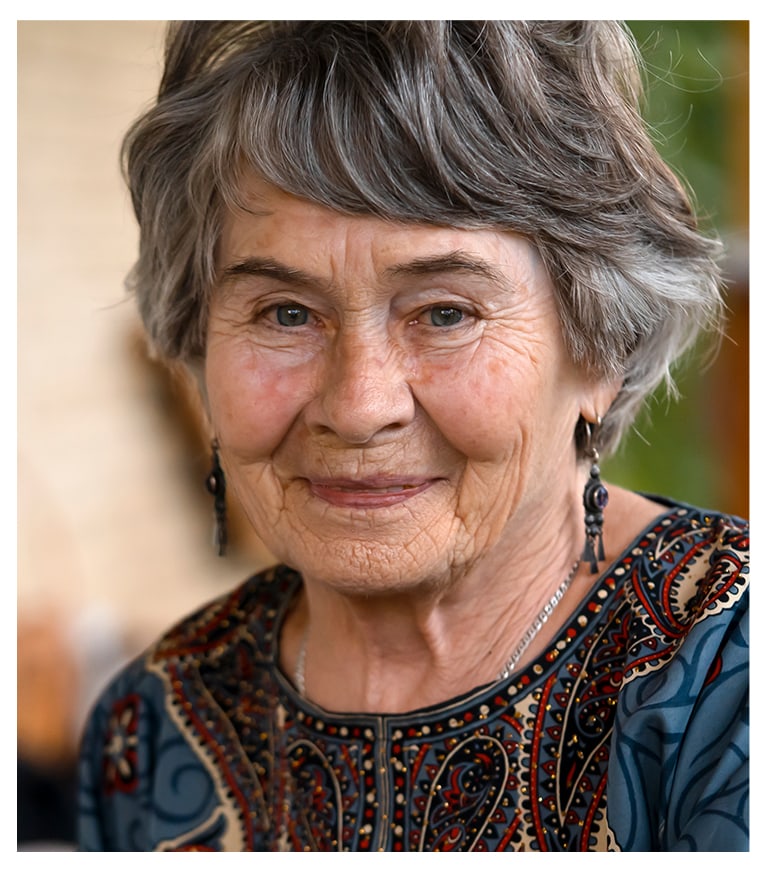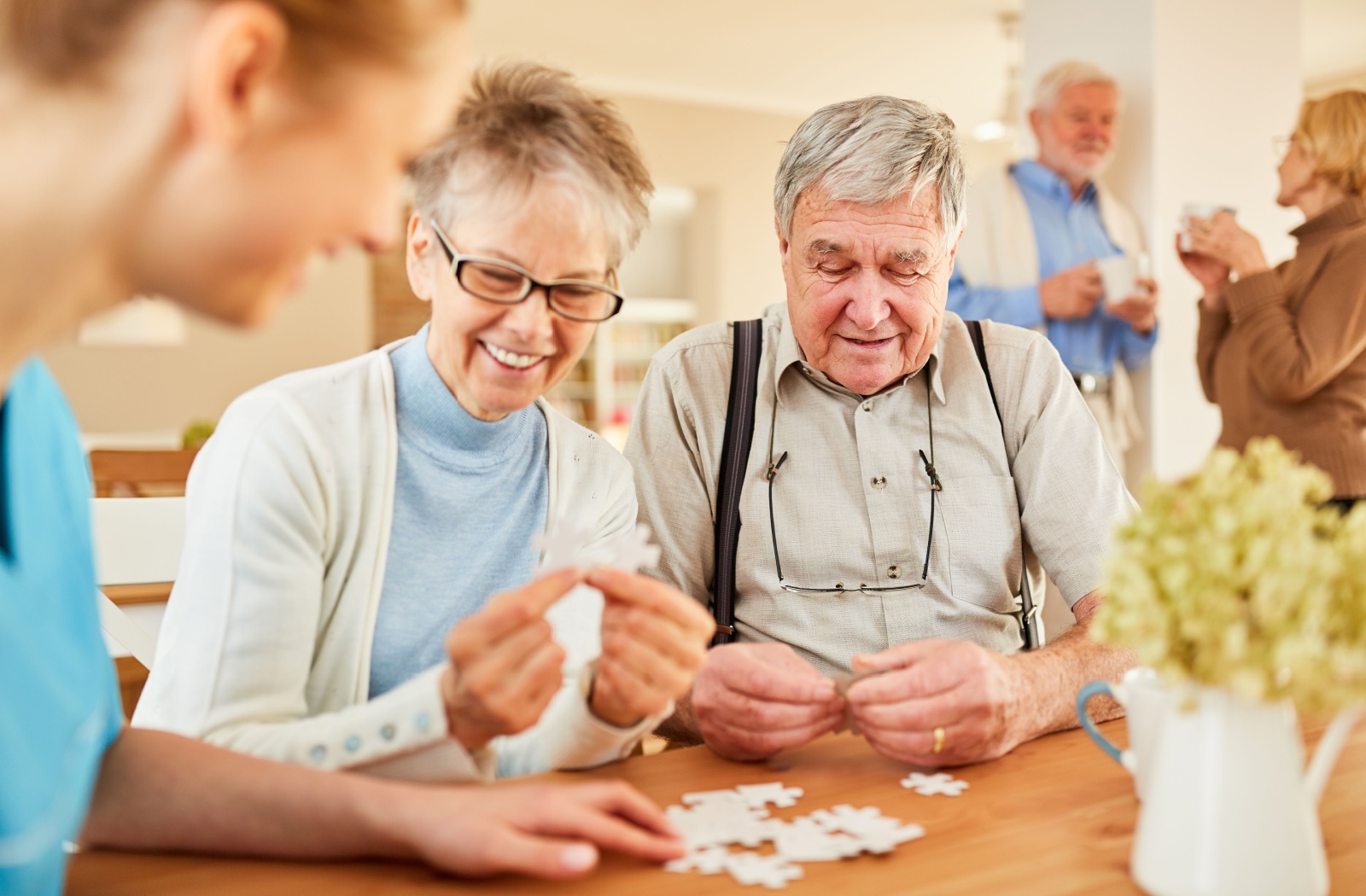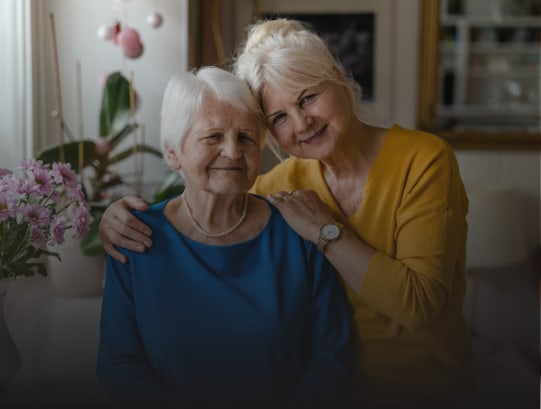Caring for a loved one with dementia isn’t just about meeting their daily needs. It’s also about finding ways to keep life engaging, fulfilling, and joyful. Tailored activities provide significant value to older adults living with cognitive decline, and they’re a great way to make every day unique.
11 activities that can help older adults with dementia include:
- Puzzles and brain games
- Storytelling
- Matching games
- Chair exercises
- Nature walks
- Dancing
- Gardening
- Crafting & painting
- Sensory boxes
- Photo albums
- Listening to music
Cognitive Hobbies
Cognitive hobbies are a wonderful way to keep the brain active and engaged. These activities strengthen problem-solving skills, improve focus, and provide gentle mental stimulation. Even more ideal—they’re fun, simple, and ideal for older adults with cognitive decline.
Puzzles & Brain Games
Puzzles and brain games can be beneficial for the brain. They’re a chance to slow down and enjoy a quiet, calming activity. Meanwhile, they boost mental agility, which is invaluable.
Simple jigsaw puzzles, word searches, and memory card games are great ways to provide cognitive engagement without being overwhelming. These activities foster a sense of accomplishment while encouraging focus and relaxation.
Storytelling
Storytelling can be rewarding for older adults. This simple hobby gives your loved one the chance to share their life experiences. Storytelling is a great way to spark past memories while spending time with others.
This activity doubles as a meaningful way to engage with memory therapy. By recalling past experiences, your loved one can stimulate their memory and maintain their cognitive abilities.
Matching Games
Simple memory card games offer a fun challenge. They also help improve recall skills and keep the mind sharp. Matching games can easily be tailored to include pictures or items that hold personal significance.
Physical Hobbies
Physical activities are rewarding. They help your loved one stay physically healthy and active. However, exercise doesn’t need to be strenuous—gentle exercises are just as effective. A person’s diet, exercise routine, and lifestyle are closely linked to a healthier life.
Chair Exercises
For older adults with mobility limitations, seated exercises are excellent. They’re adaptable exercises designed to be slow and impactful. Some popular chair exercises for older adults include:
- Seated leg lifts
- Arm circles
- Seated marches
- Toe taps
- Side stretches
These activities promote movement without overexertion.
Nature Walks
Nature walks are a simple yet rewarding way to stay active and connected to the outdoors. Your loved one can enjoy fresh air, gentle movement, and the calming beauty of natural surroundings. This offers plenty of physical and cognitive benefits to older adults with dementia.
Dancing
Dancing is a joyful and engaging way to encourage physical activity. It’s also helpful for boosting mood and energy levels. It combines rhythmic movement with music, stimulating both the body and mind.
For older adults with dementia, dancing can be a soothing activity. It’s a chance to move and have some fun while enjoying some of their favorite songs.
Tactile Hobbies
Tactile hobbies can be rewarding when dementia is a factor. They stimulate the sense of touch and improve a person’s fine motor skills. Meanwhile, they’re also highly rewarding and provide a new sense of achievement.

Gardening
Gardening offers a soothing way to stay engaged. The sensory activities involved in gardening spark joy while improving motor coordination. Spending time in nature is beneficial for older adults living with dementia.
Meanwhile, gardening benefits physical health as well. For those with limited mobility, there are adaptive gardening tools and techniques that can make the activity more accessible.
Crafting & Painting
Crafting and painting can be delightful activities for older adults with dementia. These hobbies provide a soothing way to focus on tasks and maintain fine motor skills.
Simple projects such as card-making or painting with washable paints create opportunities for older adults to explore their artistic side. Meanwhile, colorful, hands-on crafts can bring a sense of purpose and spark feelings of accomplishment.
Sensory Boxes
Sensory boxes are an excellent way to provide stimulation through touch. These boxes are filled with materials or objects of different textures, colors, and weights, stimulating the senses in gentle, enjoyable ways.
Fill a box with items such as fabric swatches, smooth stones, or even textured balls. Encourage your loved one to explore the box, identify the items, and describe how they feel.
Memory Hobbies
Memory-focused activities offer a way to recall significant moments, fostering a sense of identity and joy. These hobbies create opportunities for older adults to reconnect with their past.
Photo Albums
Looking through photo albums is a touching and relaxing way to reminisce with a loved one. Photos offer visual prompts that connect them to cherished moments. Spend time flipping through albums together, and encourage them to share. This can deepen your bond and give your loved one the chance to share their memories.
Listening to Music
Music is a powerful tool. It evokes emotions, promotes memory recall, and stimulates cognitive function. Musical activities such as singing, playing instruments, or listening to personalized playlists can be great options for individuals with dementia.
Creating Engaging Moments Together
Older adults living with dementia benefit deeply from activities like these. All of these hobbies can offer significant stimulation, from puzzles to gardening and everything in between.
Here at The Grande at Laumeier Park, we love offering residents new activities to try. That’s why we offer so many different events and experiences to residents. In our community, your loved one will get the support they need every day to live the life they love to live. Schedule a tour with us today to see for yourself!










